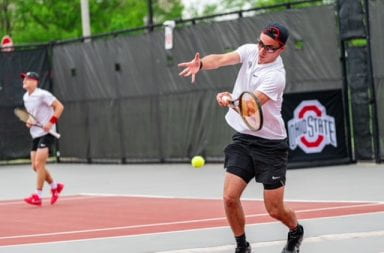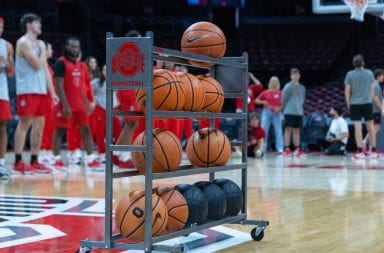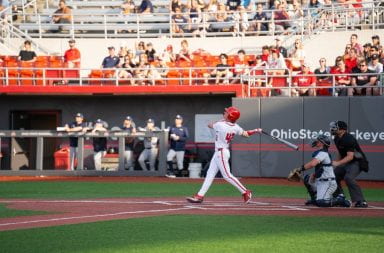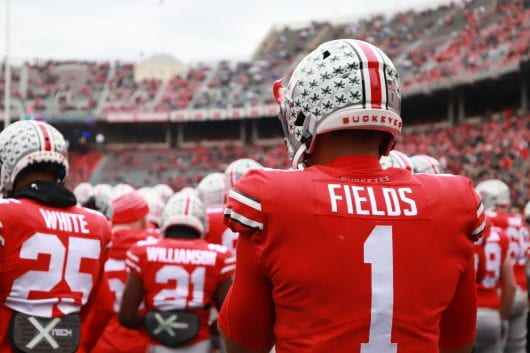
Ohio State sophomore quarterback Justin Fields (1) takes the field in the game against Penn State on Nov. 23. Ohio State won 28-17. Credit: Cori Wade | Assistant Photo Editor
A unanimous October vote from the NCAA Board of Governors, including chair of the board and University President Michael V. Drake, directed the NCAA’s three divisions to update its policies regarding student-athlete profit from name, image and likeness by January 2021. But for some, that’s not soon enough.
The Senate’s subcommittee on manufacturing, trade and consumer protection held a hearing Tuesday in Washington D.C., where NCAA president Mark Emmert, university administrators, college athlete advocates and Ohio’s 16th district congressional Rep. Anthony Gonzalez –– an Ohio State wide receiver from 2004 to ’06 –– debated over solutions to a system they each said requires radical modification.
“The reality is, the train has left the station on NIL,” Gonzalez said. “It is no longer a question of if, but rather when and how. Congress must act to preserve the collegiate sports system we all know and love. For those reasons I have begun to draft federal legislation in the House to allow student-athletes to profit from their NIL and create one uniform national standard.”
California’s Fair Pay for Play Act gave student-athletes in the state the legal right to compensation for their identity Sept. 30, but Gonzalez criticized the bill for allowing state-by-state discrepancies in NIL policy to “throw the collegiate athletic system into chaos.”
He said the bill lacked nuance in dealing with third-party bad actors and the potential for student-athletes to become employees of an institution.
“If a student-athlete can be hired, that means he or she can also be fired,” Gonzalez said.
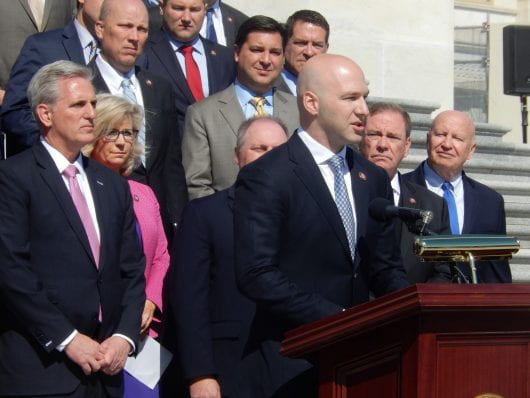
Rocky River Republican Rep. Anthony Gonzalez addresses a Capitol Hill press conference. Courtesy of TNS
Gonzalez cited the “unequal footing” that schools in the same conference across state lines may have due to the difference in state-by-state policy, and Emmert said litigation threats and state efforts have complicated the NCAA’s ability to move quickly in its attempts to update policy.
“We simply don’t believe our schools can effectively support students and host fair, national competition if college athletics is pulled in various directions by state legislatures,” Emmert said. “It’s critical that the administration of college sports be undertaken by the NCAA at a national level.”
However, Blumenthal said he would encourage states to move forward with legislation in an effort to expedite the process of the NCAA, which he said was “late to the party.”
“I think a lot of the rhetoric and images that we hear about college sports are as antiquated as leather helmets,” Blumenthal said. “And that makes me angry because I think that the current state of college sports is exploitative.”
Ramogi Huma, executive director of the National College Players Association, said federal legislation is not necessary for reform in this area.
However, Huma added that it could provide benefits in guarding against bad actors interfering in recruiting from high school and college transfers, as well as stopping universities from coordinating third parties themselves.
Huma said the NCAA holds a double standard, claiming to protect its players from the forces of commercialization while allowing companies to pay hundreds of millions of dollars to universities to require student-athletes to serve as “walking billboards” for their products.
Huma also refuted the notion that state-by-state laws would make the college sports landscape any less fair than it already is.
“College athletes shouldn’t be forced to sacrifice their economic freedom and rights so the NCAA and its colleges can pretend that competitive equity exists while doing nothing about huge disparities in booster donations and athletic revenues,” Huma said.
Tennessee Sen. Marsha Blackburn said she was “really disappointed” in her meeting with Emmert this past week, and raised questions about the consistency, fairness and transparency of the NCAA.
“We’re looking at a time when the NCAA has failed when it comes to women in sports, sexual harassment, sexual assault, sexual abuse that has occurred,” Blackburn said. “And I think a question that must be going through a lot of minds of student-athletes and their parents is, ‘How in the world are they going to be able to trust you to get this right?’”
West Virginia Sen. Shelley Moore Capito agreed with Emmert and Gonzalez in the stance that each state having separate NIL policies would be detrimental to fairness, calling the proposition “a nightmare for our country.”
Emmert said the NCAA doesn’t yet have anything on paper regarding policy updates, but that he hopes it will by April ahead of its self-imposed January 2021 deadline.
